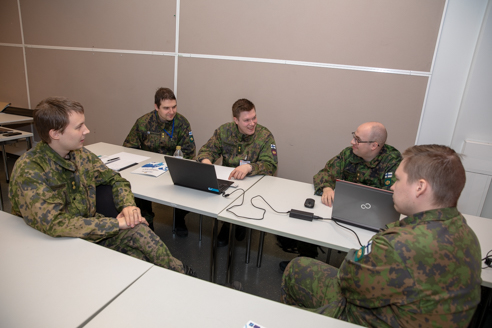Two study units will provide master’s degree students with an opportunity to delve into crisis management
The Department of Leadership and Military Pedagogy organizes study units Comprehensive Crisis Management and Leadership in a Crisis Management Operation together with the Finnish Defence Forces International Centre in May 2019.

First Lieutenants Mikko Koponen, Jani Lindholm, Sampo Suihkonen and Veli-Pekka Tikkanen are students attending the course. They discuss these study units during the first week which focuses on comprehensive crisis management. The students expect these three-week study units to help them understand the working experiences they have obtained on crisis management operations at a deeper level, and to provide them with an opportunity to practice working at an international headquarters.
These three-week study units consist of lectures, team work assignments and an exercise
The program for the units has been divided into three weeks. The topic for the first week includes comprehensive crisis management and discusses the overall contents of the course. The following two weeks will be devoted to a headquarters exercise organised at FINCENT’s premises. When the overall contents of the course were discussed, the things that came up included operating outside one’s comfort zone, the complexity of crisis management, and the fact that in a crisis zone, what is considered "normal" depends so much on the context. In the course of the following weeks, the students will be invited to reflect upon and question their own expectations and knowledge of how one should operate in a crisis zone.
All three of the weeks that make up the study units are mandatory for military pedagogy majors. The two headquarters exercise weeks will also be attended by leadership majors and students who take the course as an option. First Lieutenant Sampo Suihkonen says that the study unit that just started is the only one that focuses exclusively on crisis management, even if the topic has been covered to some extent on other courses as well.
The students hope to get an opportunity to widen their understanding of crisis management and practice international headquarters work
First Lieutenant Jani Lindholm states that for him as a master's degree student, these study units are a unique opportunity to deepen his know-how in crisis management. In the coming weeks, he expects to be taught with methods that simulate operating in a military setting, including a situation designed for the purpose.
-It will be interesting to see how the educational organisation manages to simulate the operational environment of a crisis management operation. Is the situation designed for the exercise based on a combat or training operation? Lindholm wonders.
Sampo Suihkonen and Mikko Koponen say they, too, expect to get practice in operating in a crisis management environment and at international headquarters, and to grasp the concept of comprehensive crisis management. According to Suihkonen, apart from learning about crisis management, improving his English is one of his learning objectives, because these study units will be just about the only entities taught in English during his studies.
- I would like to know more about the different actors operating in a crisis zone and how their activities are coordinated. At this point, all we know is that there are a lot of them, but we don’t have any detailed information yet, Koponen says when asked about his learning objectives.
As many others, Veli-.Pekka Tikkanen expects the course to provide him with a wider understanding of all the aspects coming under the domain of crisis management. Tikkanen has about five years of experience from crisis management duties. He says that earlier, when being deployed on an operation abroad, one hardly had any theoretic knowledge with regard to how complex crisis management was.
- I believe that having completed this course I will be able to understand my earlier experiences in a new context, Tikkanen explains.
Students would be interested in international duties in the future
All the students interviewed say that they would be interested in crisis management duties in the future. Koponen is convinced that the following weeks will provide basic information in the event of crisis management duties coming up. However, he says, the knowledge becomes concrete only when deployment becomes a reality. According to Tikkanen and Suihkonen, the course will strengthen the motivation to continue serving in international duties.
- I have served in international duties and as soon as another opportunity opens up, I most certainly want to take it, Tikkanen says.
- It is never a disadvantage to know or learn more, Lindholm concludes.
The aim is to deepen knowledge about comprehensive crisis management and working at the headquarters of NATO-led operations
Having completed the study units, the students will have the know-how to serve at a multinational headquarters complying with staff working procedures and produce plans and orders in accordance with the NATO planning process. The objectives also include having the students improve their military English skills, helping them to understand the procedures used in NATO-led crisis management operations, and, among other things, helping them gain an in-depth understanding of what comes under crisis management operations leadership and training.
What is more, the course will deepen the students’ knowledge of international human rights regulations, the concept of comprehensive security and the ways and methods of leading crisis management operations and providing information about them. The students will be given by FINCENT the Junior Staff Officer Course Certificate upon completion of the course.



